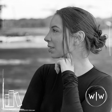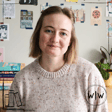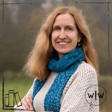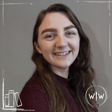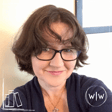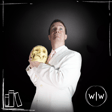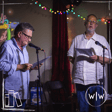Become a Creator today!Start creating today - Share your story with the world!
Start for free
00:00:00
00:00:01

245 Sarah Beth Durst | Bestselling Fantasy Author
Fantasy author Sarah Beth Durst swings by to chat about her latest cosy fantasy novel, writing fantasy across all of its different sub-genres and age groups as well as the long and winding roads of publishing.
Support the show on Patreon! 💖 And get extended episodes, ad-free and a week ahead of everyone else. 🙏
For audio listeners:
Listen to The Chosen Ones and Other Tropes, Jamie's other podcast with Melissa Welliver and Naomi Gibson! 📚
Follow on socials! 🥳
Transcript
00:00:00
Speaker
Oh, a spicy question. I love Because the writing is sort of everything, right? Like you can fix plot holes, but if the writer... So some readers love that and some readers are like, but I wanted more of this. So it's kind of, it's kind of a gamble.
Introduction to Sarah Beth Durst
00:00:14
Speaker
Hello and welcome back to the Right and Wrong podcast. On today's episode, I have with me a New York Times and USA Today bestselling author who writes adult, young adult and children's in literature from all the way across the pond it's Sarah Beth Durst. Hello!
00:00:31
Speaker
hi I'm so delighted to be here chatting with you. Yeah, so great to have you on. ah we always like to start these by talking about your your latest release, your latest publication, which is The Enchanted Greenhouse, um a cozy fantasy. It's out already, you can get it in all the usual places.
Exploring 'The Enchanted Greenhouse'
00:00:49
Speaker
Tell us a little bit about The Enchanted Greenhouse. The Enchanted Greenhouse is a cozy fantasy. So that means it's designed to feel like a hug. i want this book to feel like you're escaping, that whatever is going on in your life, whatever it is stressing you out, you can come here and take a deep breath. it is about a librarian.
00:01:12
Speaker
who cast an illegal spell to create a sentient spider plant, you know as one does, and was transformed into a wooden statue as punishment. But this is a story of what happens to her after that. She wakes human again, alone, cold, snowing. She's on this nearly abandoned island that's filled with magical greenhouses.
00:01:35
Speaker
Oh, okay. So a lot of questions there, which i'm I'm sure you cover and answer throughout the book.
Universe and Writing Style
00:01:40
Speaker
um Am I right in thinking that this is within the same universe as The Spell Shop, which was a book that you released last year?
00:01:49
Speaker
Yes, absolutely. It's set in the same world. It's written as a standalone, so you don't have to have read Spell Shop first. But if you have read Spell Shop first, there's definitely some... Easter eggs that you'll discover as you're reading. And I just, I love writing in this world. it is such, it's been such an immersive, immersive, joyful experience to write. I basically sit down and say, what makes me happy?
00:02:12
Speaker
And then I write that. ah Okay.
Transition from Epic to Cozy Fantasy
00:02:15
Speaker
The Cozy Fantasy. Was The Spell Shop the first time that you'd written within that genre? Yes.
00:02:22
Speaker
Yes, it was. I just, I really wanted to write ah gentle book that was fantastic. filled with kindness and enchantment. That was, that's what I needed to write at the time. And it's been such a wonderful experience to write these books.
00:02:37
Speaker
They're so fun. I highly recommend writing cozy fantasy if you haven't tried it. It's funny. I've had quite a few cozy fantasy authors on recently, and there definitely is a certain joy when, because I think a ah lot of people started in different genres and then moved into cozy fantasy and then sort of in a weird way kind of found themselves as a writer where they were like, this was what I was always supposed to be writing. Did you find something similar?
00:03:01
Speaker
I love writing fantasy just in general. i love writing the impossible. So I'm in love with the entire genre, really.
Crafting Cozy Fantasy
00:03:10
Speaker
um Cozy fantasy, it's actually kind a tricky genre to write more more so than it seems. It's it's got these these like technical challenges to it because when you learn to write by being told to always raise the stakes, always ratchet up the tension.
00:03:27
Speaker
And cozy is the opposite of that. You want it to feel peaceful, which... requires a lot of breath in the prose, which isn't what we're naturally trained for. So I'm not sure I could have written cozy if I hadn't written epic fantasy first, because epic taught me, you know, you've got the great battles with your bone armies or bloodthirsty nature spirits, or those are my epics, not random examples.
00:03:56
Speaker
Yeah. because if i If I hadn't done that, i don't think I would have known exactly when to pull back.
00:04:08
Speaker
Because it's it's ah it's kind of a genre of restraint, um which makes it really interesting to write just from a sheer craft standpoint. And and a lot of fun, too, is to be like, all right, now I'm going to take a breath. Because...
00:04:22
Speaker
The whole thing with cozy and, you know, epic, we're saving a world cozy. We're saving a soul. We're saving a heart, which makes it very different and pacing and style and voice and just so much fun. Cause
Writing Approach and Routine
00:04:36
Speaker
as you you mentioned, it's,
00:04:38
Speaker
there's There's a lot of places you can jump off to write ah book, a lot of things that can fuel you. There are magnificent books out there that have been fueled by outrage or spite, and that works great.
00:04:50
Speaker
But Cozy, these books, the core is joy. That's what what fuels them for me. And that getting to retreat to that space of of joy and creating something that you hope will make a reader happy,
00:05:03
Speaker
is a wonderful experience and i feel very very grateful to have discovered this genre thrown myself into it okay so obviously the the contrast is quite big between like we're talking about epi epic fantasy cozy fantasy and you've been would you say you know you've you've written a lot of books um when it comes to fantasy you generally leaned into epic that was kind of the genre of fantasy that you were in hi done most of it. But yeah, but I'd probably say the most was epic. My children's books are more like fantasy adventure where you're usually riding on something that flies. um There's a lot of talking animals. I adore talking animals. So many, many talking animals.
00:05:46
Speaker
um i But I've always tended to write optimistic fantasy. i'm not ah I'm not a grimdark girl. i I like to write with a lot of hope, even when bodies are falling here and there and everywhere.
00:05:59
Speaker
um So I think cozy was a very natural next step for me. Okay. Right. Yeah. That, that was what i was going to ask is like, yeah, was it a big juxtaposition, but it sounds like you sort of eased yourself into it and then it was just a sort of.
00:06:12
Speaker
Yeah. It felt really natural. Like you said, lots to with pacing. Yeah, exactly. It's just every new new book has a different voice. So it's just about finding what the music is and in a particular voice. For instance, I've written The Lake House is a YA supernatural thriller.
00:06:29
Speaker
And the music for that is ever increasing heartbeat that ends ah chapter with a gasp. So it's a dread do did it oh kind of music to the language, which means there are very few adjectives and adverbs. The sentences tend to be short with um verbs with strong consonants. There tends to be a lot of white space ah to leave room for for the fear to build in the story.
00:06:54
Speaker
so it's that kind of music, whereas something like the spell shop or Enchanted Greenhouse There are a lot of adjectives and adverbs. the The words tend to use the softer vowels to pull out the sound. um There's more of iambic pentameter kind of rolling music to it. The paragraphs tend to be slightly longer. um There are more non sequiturs in the dialogue. And there's a lot of food. We're often eating things.
00:07:23
Speaker
Yeah, there's definitely a tie between cozy and food. There it is. Yeah, it'll be a certain type of food as well. Often like baked things and things that smell nice and sweet.
00:07:38
Speaker
There's time to bake things in a cozy fantasy, whereas if you're running from for your life in an epic, you don't have time to, you know, bake your cinnamon rolls. True. That's true. Yeah, yeah. um ah When it comes to the the process itself, um as I mentioned, you've written many, many books.
00:07:58
Speaker
And this has probably changed over time, but I did pick up that you mentioned you kind of find the way to write each book. Do you have a set kind of process or approach when you are creating a new book? Like, do you ah you do you always plan everything out or are you someone who's much more of a pantser?
00:08:13
Speaker
I love that question. it varies a lot. And it's also, as you point out, Enchanted Greenhouse is my 30th book. So my process has definitely changed with time. um I do tend to plan things out and then completely ignore my plan.
00:08:27
Speaker
So both. okay do I'll do an outline, you know, and it'll be like a page and a half and three quarters way through it'll be like, and then something awesome happens. And I figure I'll figure it out when I get there.
00:08:42
Speaker
um But I like to know the shape of the story. i like to know the feel of the ending I'm going for, even if I don't know all of the details. And then I like to leave myself open for discovery as I write.
00:08:55
Speaker
So I think my answer is both. I do both. Okay. Okay. Do you, do you, do you sort of have like, um, points throughout the story that are sort of fixed? Like you're like, okay, we're going to start with this thing, but then, at you know, around halfway, this is going to happen.
00:09:12
Speaker
And then at the end, this is how it's going to end. i do. i kind of, I do have a sense of what direction I want it to go. Um, maybe slightly less when I'm writing cozy fantasy than when I'm writing something that is more, plot driven.
00:09:28
Speaker
Um, right for instance, you know, to go back to abbec Epic, Epic, you need to accomplish a certain saving the day kind of task. So those sort of tentpole plot elements have to be there. Otherwise, it won't feel like an epic. If we just ran meander around in the woods for the entire 300, 400 pages, it's not going to feel very epic. yeah So you have to have the battles. You have to have the confrontation. Otherwise, it won't get your heart racing. It won't have that excitement that you crave when you're reading an epic.
00:10:01
Speaker
Cozy yeah has the ability to meander more. So you can take your time and, and and you know, side quests are all over the place in Cozy. know, we we're going to go and and meet this character over here. We're going to go and wander into this greenhouse. We're going to swim with a sea turtle for a little while.
00:10:18
Speaker
We're going to discover this this new creature and hang out with them for a bit. So it does... um leave you open as a writer to explore which is a lot of fun because you can really delve into the magic in the wonder of the world that you're creating yes a lot of it's just sort of the vibes and like the vibe what's going on exactly it's so much vibe and when i sit down to write the spell shop usually when i write a book i start with you know an actual idea
Embracing Writing Joyfully
00:10:53
Speaker
I do recommend that in general. The Spell Shop. What I really knew was how I wanted the reader to feel. i wanted the reader to feel like they're sitting next to a friend. friend's got their arm around you and is saying, everything is going to be okay.
00:11:09
Speaker
You're not alone. And so everything I built in the world and the plot and the characters is designed to enhance that feeling. So I grew it out of an emotion, out of a vibe, rather than a particular...
00:11:25
Speaker
core idea of something solid. Do you know, does that make any sense? but Yes. Yeah. I understand. Which I would imagine is it is a different process to when you're writing something that's like epic fantasy, saving the world, or everything's building towards kind of one very climatic moment.
00:11:44
Speaker
Yes, yeah, it changes how you plot. It changes, um it puts the emphasis a lot on the character's emotional journey. yeah In general, they're they're low stakes plot-wise, but there's really high emotional resonance in this kind of story. You really want the character...
00:12:02
Speaker
to experience something in their heart and and therefore translate that to the reader. So there is a lot of what are we feeling in the moment that goes into writing one of these books, which is an interesting um interesting challenge as opposed to, okay, how do we get out of this corner where we're about to die? you know Yeah.
00:12:27
Speaker
Would it be, do you think it will be a challenge following a cozy novel to go back to like a very dramatic epic fantasy novel and then kind of recalibrate into being like oh no I can't linger and and just enjoy the smells of the flowers and things I have to like keep going but is Whenever I switch sort of languages and switch music to a different book, there is a recalibration. i always have to spend at least a week finding that and that other voice. So I do write a lot of books, but I can't do them simultaneously.
00:13:00
Speaker
Because the voices tend to be so different. So I'll work on one for for a couple months, and then I'll so i'll switch gears. um For instance, I'll work on one my adult books, and then I'll switch to the YA, and then I'll switch back. So that switching of voices is always, it requires a lot of chocolate. Yeah.
00:13:21
Speaker
Okay. That's interesting. Cause I, it's not, and I've heard, um, Brandon Sonson talks about how he, he usually has like two or three stories on the go at once. Cause he likes to, if he, if he's kind of stuck on one, he moves to the other one. And then by time he gets back to that one, he's like not stuck anymore.
00:13:36
Speaker
You're kind of doing that, but with a much longer stretch between us and like you'll lock in for a month or two and then you'll swap back and then you'll come back to that later. that generally how you work?
00:13:47
Speaker
Yeah, that's exactly it. Yes. okay And i like that really I like doing that. Yeah. Cause you can really sink into it that way. Now, if I have one story going on at the same time, it means that I'm always living inside that world, no matter what I'm doing, whether I'm at my keyboard or not. Cause I mean, I have no work life balance. I basically write all the time and I i just have it woven throughout my everyday. And I wake up, I write a little, I have some breakfast. I write a little, I'm to the dishwasher. I write a little.
00:14:18
Speaker
And by working on one story at a time, it means that that music is always playing inside me. So can I find that helps. Yeah. But you also taking advantage of, you you know, some of the, there's, there's a lot of advice out there about how I think Zadie Smith said something along those lines. I could be, I could be wrong. might've been someone else, but was basically saying that the best thing you could possibly do for a novel is like to finish it and then leave it for as long as you can years if possible, before you come back and edit it And you're kind of,
00:14:49
Speaker
doing that on ah so on a small scale of kind of like writing a bit, then leaving that and totally disassociating with it to write something else. And then a few months later coming back to that. Yes.
00:15:00
Speaker
Yeah. that Yes. And it helps a lot because then you're coming back to it with some fresh eyes. Whereas when you're in the middle of writing it, you kind of lose objectivity after a while. You can't, you stop being able to different differentiate what's in your head and and your mind and what's actually on the page. Whereas if you do get to take a break and leave it and live in another world and then come back,
00:15:24
Speaker
those fresh eyes will help you see what's actually
Durst's Writing Journey
00:15:26
Speaker
there. um So it does it does work Yeah, yeah, absolutely. That's, that's great. ah It's not, I'd not heard of that before, of that kind of ah doing that, that approach before, but that's, that's really good. I might try that at some point.
00:15:42
Speaker
um You sort of touched on it, but I wanted to ask about, like you said, this is your 30th book. Your debut novel into the world came out in 2007.
00:15:53
Speaker
yeah as far as I could tell, you have published every single year, twice and and three times in some years since then and now, which is incredible, like incredible level of consistency.
00:16:08
Speaker
Um, so I wanted to ask, do you have, have you got like a dialed in routine when it comes to like, when you're writing, where you're writing and just like getting things done?
00:16:20
Speaker
I used to When i started out um started out, it was useful to have set times when I write to kind of develop that that level of self-discipline and to give it the time it deserves. Because sometimes when you start out writing before I know before you you feel comfortable calling yourself publicly a writer, you feel like you're stealing the time. You feel like you're not entitled to take that time away from other people and other demands on your hours. So it helps to carve out and say, this is my writing time and kind of put a nice little fence around it that no one can cross and that you can't cross. You can't go and wander off and do something else.
00:17:06
Speaker
that that looks shiny and appealing um to get that sitting in the chair time. Sometimes you need to to draw those boundaries. But after after a while, once you start doing that, it becomes a habit as much as brushing your teeth.
00:17:23
Speaker
It just becomes a part of your day that I write. That is what I do with my days. It's what makes me happy. So I don't, I don't need to anymore draw those clear. This is writing time because anytime I'm not doing something else is writing time.
00:17:40
Speaker
And just, I love, i love doing it. So getting myself to the keyboard is not, i don't have to trick myself to doing it. I just have to do it.
00:17:50
Speaker
oh Yeah. Yeah. yeah I understand. I, yeah, that's such a relatable thing is people, people are loathe to go, call themselves writers or authors before they've looking for some kind of um validation from the industry or something like Was that something that you experienced when you were first coming into this?
00:18:13
Speaker
I've always wanted to be a writer for as long as I can remember. It's the only thing I've ever wanted to do. but there is a certain, there are all these these writing myths that you have to let go of.
00:18:25
Speaker
For instance, that writing needs to be hard, that it needs to be painful, that it needs to be like the open up a vein and spill blood on the page.
00:18:36
Speaker
And sometimes that's true. That's a kind of writing you're doing, but sometimes You can just play with words. You can bring a character to life. you can play with a scene. You can ride on a dragon. You can do all these fun things.
00:18:50
Speaker
It's okay for writing to be fun. It's okay to play and to give yourself yeah permission to play. It doesn't have to be perfect right off the bat. doesn't even have to be readable right off the bat.
00:19:01
Speaker
It can be... Anything. So letting go of that perfectionism is important. Letting go of that belief that you need a long stretch of uninterrupted time to write is important because nobody has long stretches of uninterrupted time.
00:19:19
Speaker
You need to write in the corners until you can get the stretch of time that you need. Write in 15 minutes, write a moment, and then write another moment, and then another moment. And that's how you can string a story together. You don't need ah huge free day.
00:19:37
Speaker
um and the other myth to let go of is that you need to feel inspired. You don't. You can sit down, start writing, and the muse will show up. after the fact, after you're already writing.
00:19:49
Speaker
So i think in the beginning, it's hard to let go of those myths of how you think you should be doing it, how you think your writing should look, the stories you think you should be telling, and embrace how your mind actually works, how your creative process works, because everybody's creative process works differently.
00:20:09
Speaker
So it's a matter of figuring out what works for you, and that that kind of takes a while. um Yeah. And that's how you kind of set yourself free and then sort of gain the confidence to be like, no, I am a writer. And like, this is just how I write. Yes, exactly. Exactly. And it's the wonderful thing about writing is it's a thing you learn by doing. you don't have to take a particular class or be in a writing group or find a writing, whatever, you know, there's there's no one way to do it you just have to write and then you get better at it by doing and you you gain confidence that that first book you finish um i actually so i started writing when i was 10. that's when i i did my wrote my first story outside of things required for school um and i wrote a whole lot of story beginnings and then i get to that mushy metal and be like nope i'm gonna start a new one this is terrible
00:21:04
Speaker
I did that for a really long time through middle school, high school, college. After college, um my my now husband got a fellowship to study physics at Cambridge University for a year. And I was like, I'm going to go live in England with you for a year.
00:21:21
Speaker
And so ah we went and I said, this year, I'm going to finish a novel. And i did. So I became a writer in England and finished that book. And it's terrible. It is in the closet behind you No one will ever read that. but it was life changing because it taught me I could do it.
00:21:42
Speaker
I could do a beginning, middle and end and get through a whole thing. And that experience of finishing one made the next one easier. And the one after that, you sort of. you learn what works for you. And that makes a huge difference. And I wish somebody had told me that in the beginning, that it in some ways it really does get easier because you learn to believe in yourself.
00:22:03
Speaker
and And that makes a world of difference. Yeah, absolutely. and and And a lovely sentiment um to to wrap up this port part of the interview with as ah we are at the point where I um steal you away and ship you off to a desert island and ask you, Sarah, if you were
Favorite Comfort Reads
00:22:23
Speaker
stranded on a desert island with a single book, which book do you hope that it would be?
00:22:29
Speaker
think I'd want to have beauty by Robin McKinley. Okay. It is a reach. It's a retelling of beauty and the beast. And it's a book that I read when I was a kid and have reread frequently since then. And it's one of those books where you, you feel like you're revisiting a place that lives inside your heart.
00:22:50
Speaker
know, her library filled with every book that's ever written and every book that will be written is a beautiful place to spend time in. So I think that i think that one's the book I'd want.
00:23:03
Speaker
Yeah, that's one of those stories that sort of transcends um pop culture in some ways. i was i was talking to my sister the other day and and I really, know I had this thought randomly, but she was talking about the dream of of having, and I think this is the dream of most people who like books, is to have the ladder on your bookshelf. Yes!
00:23:24
Speaker
yeah
00:23:26
Speaker
And she describes it as like, oh, you know, like Bell's, like bookshelf, like in Beauty and the Beast. And is that's how everyone like references it. They're like, oh, you know, like can beauty in Beauty and the Beast. Absolutely. I, yes, I want that. How about you? What would you pick as your desert island book?
00:23:44
Speaker
Um, well, I, I, I realized that because people often ask me this, um, in retaliation, let's say, um, and I realized it could change almost on a daily basis, or or if if I've just read something I love, I'll be like, oh that, but I realized I should stick to two things that I'd like would happily reread and things like that. So usually I'll go for, um, the hitchhiker's guide to the galaxy or small gods by Terry Pratchett.
00:24:14
Speaker
Those are good choices. Terry Pratchett. I don't listen to audiobooks very often because I prefer syncing into the the words on the page. But I started listening to We Free Men.
00:24:27
Speaker
And the wonderful thing about Terry Pratchett is the beauty of his sentences. Every time you you sink into his, it's not just the stories that he tells well, but the the cleverness of the wordplay. It's just...
00:24:40
Speaker
That's definitely a book I could, definitely an author I could see rereading a lot. but but Oh yeah. Well, you you wouldn't have to, is there's so many books out. so That's true. it's true. Yes.
00:24:52
Speaker
And I feel like he, he was doing cozy kind of before cozy was really this big genre that it is now. Yeah. yeah yeah do think and people talk about cozy fantasy as if it's this new thing and I really don't think it is.
00:25:08
Speaker
It's a new name, but I mean, Howl's Moving Castle, Diana Wynne-Jones, that's absolutely cozy fantasy. Beauty that I just mentioned, i think that counts as cozy. there There's always been optimistic fantasy that has elements of what we now call cozy fantasy. It's amazing.
00:25:25
Speaker
no literature arises out of nothing. It's all in conversation with all prior literature. So it's not like it's this brand new thing. It's just, it was the next evolution, the next step in comfort reads.
00:25:39
Speaker
And it's just now that it's broken into a sort of more mainstream culture, it's much more defined and like, uh, it has, it has its sort of tropes are now very much in place for like what you can expect in it.
00:25:55
Speaker
Yeah. Like food. When people ask me like, oh, what is cozy fantasy? i keep describing it as, oh, it's Lord of the Rings, but we don't leave the Shire. We just have a lot of second breakfast. Yes.
00:26:07
Speaker
That's great. Yeah, that's way better than what I always just try and describe legends and lattes because that's my like go to reference for it. So I'm like, oh, it's like, yeah, imagine Lord of the Rings, but it's all just about a coffee shop.
00:26:19
Speaker
And that's just because sometimes you need that. Sometimes you You just need to have the novel that's not going to break your heart and stomp it into a million pieces.
00:26:31
Speaker
And sometimes you want that. Sometimes you want your heart to be pulled like, like Kathy. um But sometimes you, you don't. And I think it's good to have choices of what sort of meal you want your heart to devour.
00:26:45
Speaker
Yes, yes, exactly. And sometimes i I'm big into, I imagine like you, ah i love my epic fantasies. I love my like Brandon Sanson, I love my Joe Abercrombie.
00:26:56
Speaker
um But then it's nice, especially between like a Joe, Joe Abercrombie is kind of silly, but. ah but between the sort of darkness intensity of that it's nice to just drop into like a a cozy fantasy and just but just reset and just take a breath and just kind of like like a spa bar day for
Cozy Fantasy in Mainstream Culture
00:27:16
Speaker
books. Yes, yes. so i'm I'm the raspberry sorbet between the other meals. so Exactly, exactly. yeah, yeah.
00:27:23
Speaker
So next up ah I'd love to chat a bit more about the publishing side of things. So breaking into the industry, finding an agent, working with different publishers.
00:27:35
Speaker
All of that stuff is going to be in the extended episode at patreon.com forward slash right and wrong. um That is a truth that i I wish I could shout to everyone that everyone has stories and inside them, unique stories that no one else can tell. So if you have any desire to write at all, you absolutely should because there's no one else that can tell your stories.
00:28:00
Speaker
Yeah, absolutely. And a lovely sentiment to to end the end the episode on. Thank you so much, Sarah, for coming on the podcast and telling us all about your kind of writing and your your experiences with publishing. It's been really, really, really great chatting with you.
00:28:16
Speaker
Thanks so much. It's been great chatting with you too. And for everyone listening, The Enchanted Greenhouse, Sarah's latest book, is out right now in all the usual places. And to keep up with what Sarah is doing online, you can follow her on all socials at Sarah Beth Durst. You can also head over to website for more stuff, www.sarahbethdurst.com.
00:28:38
Speaker
To support this podcast, like, follow and subscribe. Join the Patreon for ad-free extended episodes and check out my other podcast, The Chosen Ones and Other Tropes.
Closing and Call to Action
00:28:45
Speaker
Thanks again to Sarah and thanks to everyone listening. We will catch you on the next episode.
00:28:51
Speaker
Shout out time. One of my amazing patrons, Lee Foxton, is querying their debut novel. It's a family drama, commercial fiction along the lines of Jojo Moyes and David Nichols.
00:29:02
Speaker
Fingers crossed. I am rooting for you. Good luck.

